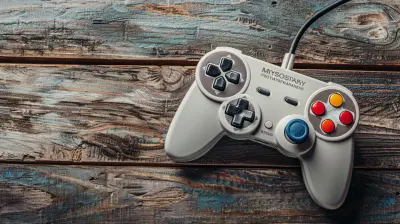31 March 2025
Let’s face it: we’ve all been there. Whether it’s in an intense multiplayer game, a gripping story-driven campaign, or maybe even a raucous family board game, the tide of battle seems stacked against you. Your resources are dwindling, your opponents are gaining ground, and despair starts to creep in. But don’t throw in the towel just yet. Here’s the thing about losing—it’s not the end unless you let it be. With smart tactics, quick thinking, and a touch of strategy, you can flip even the most hopeless situations into stunning victories.
In this guide, we’re diving deep into the art of turning the tables. Think of this as your ultimate playbook for rising from the ashes like a phoenix and leaving your opponents slack-jawed. Ready? Let’s go!
The Psychology of Losing: Why We Panic
Before jumping into tactics, let’s talk about the psychology of losing. Why do so many players crumble under pressure when things aren’t going their way?Here’s the deal: when you’re losing, your brain freaks out. It’s wired to perceive a threat, even if the “threat” is just a game scoreboard or dwindling health bar. This triggers a fight-or-flight response. Ever notice how you start making rash decisions or overextend your resources in desperation? That’s your brain trying to claw its way out of the mess without really thinking things through.
The key to turning a losing battle into a victory starts with calming the chaos in your head. Take a deep breath, assess your options, and remember—just because you’re losing now doesn’t mean the game is over.
Step 1: Assess the Situation (Don’t Just Wing It)
You know the saying, “Knowledge is power”? That’s your mantra in this step. Instead of thrashing around like a fish out of water, stop and take stock of what’s happening.Here are some questions to ask yourself:
- What’s your current position? How bad is it, really? Are you running low on resources, health, or time?
- What’s your opponent up to? Are they overextending, exhausting their resources, or becoming predictable in their strategies?
- What are your remaining assets? Do you have any hidden advantages, backup strategies, or untapped resources that could turn the tide?
In games like chess, players know that understanding the board is half the battle. The same applies here. You can’t make a comeback if you don’t know where you stand.
Step 2: Use the Element of Surprise
Here’s an underrated tactic: unpredictability. If you’re losing, your opponent probably feels pretty confident. They might even become complacent or cocky. That’s your opening.Think of this like a game of poker. If everyone thinks you’re dealt a bad hand, they’re not expecting you to go all-in. Surprise them by pulling off bold, unexpected moves.
For example:
- In real-time strategy (RTS) games, you could stage a sudden counter-attack in an area where your opponent is weakest.
- In first-person shooters (FPS), try switching to a stealthy playstyle if you’ve been going in guns blazing.
- In card games, use a high-risk, high-reward strategy to throw your opponent off balance.
Surprise tactics are a great way to make your opponent second-guess their strategy, giving you precious time to turn things around.
Step 3: Exploit Your Opponent’s Weaknesses
Every player, no matter how skilled, has blind spots. The key is figuring out what they are—and then exploiting them. Is your opponent overly aggressive, making reckless moves? Or are they playing too defensively, leaving certain areas unguarded?This strategy works especially well in team-based games. Let’s say you’re playing a MOBA (Multiplayer Online Battle Arena) like League of Legends or Dota 2. If your opponent’s team is heavily focused on offense, they might have underpowered defenses. Capitalize on that by targeting their weak points or under-defended objectives.
It’s like playing Jenga: instead of going after the solid blocks, you tug at the wobbly ones until the whole tower collapses.
Step 4: Stay Resourceful and Adapt
Here’s one thing every great player knows: flexibility is everything. If your Plan A isn’t working, ditch it and jump to Plan B—or even Plan C. In losing situations, adaptability is more valuable than sticking to rigid strategies.In strategy games like StarCraft or Civilization, this might mean pivoting your focus from offense to defense. In action games, it could mean switching weapons or changing your movement patterns. In life, it’s about knowing that setbacks are an opportunity to recalibrate, not give up.
Remember: losing doesn’t mean you’ve lost all your options. It just means you need to get creative. It’s about taking the scraps you have left and building something extraordinary.
Step 5: Use Time to Your Advantage
Sometimes, the best tactic in a bad situation is simply… patience. It sounds counter-intuitive, right? But waiting for the right opportunity can be game-changing.In games like Fortnite or PUBG, biding your time—and staying under the radar—can help you outlast stronger players who are too busy fighting each other. In RTS games, using defensive tactics to slow down your opponent and buy yourself breathing room can give you the time you need to rebuild and launch a counter-attack.
Think of it like chess: you don’t need to win every move. Sometimes, the one who wins is the one who plays the long game.
Step 6: Master the Art of Bluffing
Let’s talk about psychological warfare. Even when you’re losing, how you present yourself can make a world of difference. If your opponent thinks you’re breaking, they’ll press their advantage. But if you maintain your cool—or better yet, make them think you’ve got a trick up your sleeve—they’ll hesitate. And hesitation is your best friend.Consider games like Among Us, where bluffing is an art form. Acting confident—even when you’re out of position—can manipulate other players into making mistakes. Even in competitive strategy or FPS games, throwing out a fake taunt or making small, intentional mistakes can bait your opponent into underestimating you.
Step 7: Small Wins Lead to Big Victories
When you’re losing, it’s tempting to go straight for the big, game-shifting play. But here’s the truth: small wins add up.Instead of trying to turn everything around in one massive move, focus on reclaiming tiny victories:
- Capture smaller objectives in a battlefield.
- Chip away at your opponent’s forces or resources little by little.
- Force errors or delays in their strategy.
Small wins might not feel glamorous in the moment, but they build momentum. And momentum, my friend, is a powerful thing. Once you’ve built enough, you’ll have what you need to land that big, decisive blow.
Step 8: Never Underestimate the Comeback Effect
Finally, here’s something to remember—everyone loves an underdog story. When you pull off an epic comeback, it’s not just about the win; it’s about the journey to get there. The best victories are the ones that feel earned, like you fought for every inch of ground.So, lean into the challenge. Embrace the struggle. Every action you take, every move you make, becomes part of the story you’ll tell when you finally come out on top.
Parting Thoughts: Keep Your Cool and Stay Focused
Turning a losing battle into a victory isn’t easy—that’s why it’s so satisfying when you pull it off. It’s about finding creative solutions, staying calm under pressure, and playing smarter when the odds are stacked against you. Whether it’s a video game, a board game, or life itself, the principles are the same: assess, adapt, and persevere.At the end of the day, losing is just part of the game. How you respond to it is what sets the winners apart. So the next time you’re staring down what feels like certain defeat, remember: it’s not over until you say it is.




Isabella Conrad
This article offers valuable insights on transforming setbacks into successes. The emphasis on strategic thinking and adaptability resonates with my own gaming experiences. It's a reminder that losses can be learning opportunities, pushing us to refine our tactics for future victories.
March 31, 2025 at 3:17 PM